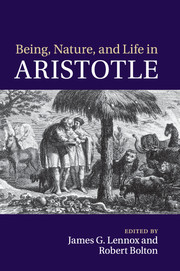Book contents
- Frontmatter
- Contents
- Preface
- Notes on contributors
- Acknowledgments
- Allan Gotthelf: a biographical sketch
- Note on abbreviations
- Introduction
- 1 Teleology, Aristotelian and Platonic
- 2 Biology and metaphysics in Aristotle
- 3 The unity and purpose of On the Parts of Animals 1
- 4 An Aristotelian puzzle about definition: Metaphysics Ζ.12
- 5 Unity of definition in Metaphysics Η.6 and Ζ.12
- 6 Definition in Aristotle's Posterior Analytics
- 7 Male and female in Aristotle's Generation of Animals
- 8 Metaphysics Θ.7 and 8: Some issues concerning actuality and potentiality
- 9 Where is the activity?
- 10 Political community and the highest good
- Allan Gotthelf's contributions to classical philosophy
- References
- Index locorum
- General index
6 - Definition in Aristotle's Posterior Analytics
Published online by Cambridge University Press: 06 December 2010
- Frontmatter
- Contents
- Preface
- Notes on contributors
- Acknowledgments
- Allan Gotthelf: a biographical sketch
- Note on abbreviations
- Introduction
- 1 Teleology, Aristotelian and Platonic
- 2 Biology and metaphysics in Aristotle
- 3 The unity and purpose of On the Parts of Animals 1
- 4 An Aristotelian puzzle about definition: Metaphysics Ζ.12
- 5 Unity of definition in Metaphysics Η.6 and Ζ.12
- 6 Definition in Aristotle's Posterior Analytics
- 7 Male and female in Aristotle's Generation of Animals
- 8 Metaphysics Θ.7 and 8: Some issues concerning actuality and potentiality
- 9 Where is the activity?
- 10 Political community and the highest good
- Allan Gotthelf's contributions to classical philosophy
- References
- Index locorum
- General index
Summary
In 1981 the proceedings of a Symposium Aristotelicum on the Posterior Analytics held in Padua three years earlier were published. These papers, which were noteworthy, have had a great influence on the exegesis of the Aristotelian corpus up to the present day. Two of them contributed more than the others to the shaping of a new conception of the Posterior Analytics, which, in my view, is still alive and active, namely the papers by Jonathan Barnes and Jacques Brunschwig. It is very likely that when they were published, these papers were considered, by their authors as well as by their readers, to be remarkably divergent. But it is a quite frequent effect of temporal distance to reveal convergences which were not previously obvious. What are these convergences, and which new elements did they introduce?
Previously, the main problem interpreters were concerned with was to locate the Posterior Analytics within the chronological and/or logical framework of the Aristotelian corpus, and to find the relation it has to the other treatises of the Organon. One may recall, in this connection, the divergent views of Heinrich Maier (1896–1900) and Friedrich Solmsen (1929). Maier thought that Aristotle, having first held, in the Topics, a Platonic position, which was used as a basis for criticizing previous philosophers – ‘sceptical’ philosophers according to Maier (Sophists, Megarians, Anthistenes) – later departed from Platonism in the Prior Analytics, where he exposed his own method, namely syllogistic, and finally restricted himself to a special case of syllogism, demonstration, in the Posterior Analytics.
Keywords
- Type
- Chapter
- Information
- Being, Nature, and Life in AristotleEssays in Honor of Allan Gotthelf, pp. 122 - 146Publisher: Cambridge University PressPrint publication year: 2010

